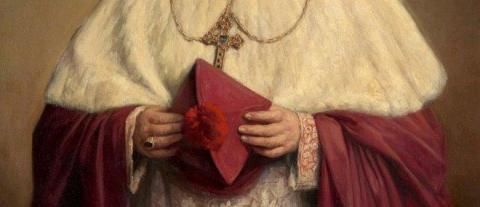Insidious titles induce a damaging culture of deference

In the functional library of the Mater Dei Institute on the afternoon of Thursday, November 26,Diarmuid Martin, the Catholic Archbishop of Dublin, had just read his statement of apology and shame following the publication of the Murphy Report on the archdiocese.
A mere 40 years ago, a former holder of the office of Archbishop of Dublin, John Charles McQuaid, was arguably the most powerful person in the country. He commanded awe and trepidation, he decreed which universities Catholics could attend, he was believed to have been the one who decided the licensing hours, the books we could read, the form of the health service we could access, the films we could view - even, on one occasion, the football match (against communist Yugoslavia) that we could not see.
Yes, there were functionaries who, theoretically, decided these matters, but the belief was that power lay in the palace at Drumcondra. People knelt on one knee on meeting him to kiss McQuaid’s ring, which he proffered almost disdainfully.
His attire of soutane and cape, both tinged with red, heralded his importance, his eminence. And he was punctilious about that eminence, reminding the Papal Nuncio of the time of his status in the Church hierarchy. Deference was his expectation, and he was greeted with deference, his utterances received with deference.
But by November 26 last, there was no trace of any lingering deference. The office of archbishop had diminished in power and eminence, not least because of the revelations of McQuaid’s conduct during his reign from 1940 to 1972, during which time he covered up abuse of girls by a priest in Our Lady’s Hospital for Sick Children in Crumlin. The old arrogance had gone, too. Martin’s tone was diffident, apologetic, defensive.
But what happened next was what marked a very different Ireland. The religious affairs correspondent of the Irish Times, Patsy McGarry, stood up abruptly. McGarry is a polite, modest man. There is no side to him, no affectation, no grandstanding. But he was almost apoplectic that afternoon, apoplectic over the abuses chronicled in the Murphy Report, apoplectic over the calculated cover-ups and lies.
It was on the behaviour of the Papal Nuncio and the Vatican that he focused the brunt of his ire, demanding an explanation for the Vatican’s and nuncio’s refusal to cooperate with the Murphy Commission. He was persistent, angry, even confrontational vis-a'-vis the Archbishop of Dublin. It was a magnificent, commanding performance.
Immediately afterwards, Nell McCafferty rose, incandescent (McCafferty does incandescence brilliantly). She ridiculed the now-cowering clerics flanking the archbishop for their presumption in calling themselves ‘‘Father’’ or even ‘‘Reverend Father’’. She focused on the archbishop himself for his presumption in having himself called ‘‘Your Grace’’.
(Actually, this charge was misplaced, for Martin does not stand on titles.) What was holy about it, she demanded.
She was followed by the normally polite religious affairs correspondent of RTE, Joe Little. Another modest, diffident man. I assumed the tone would change. It didn’t. Another spectacular, and informed, onslaught.
It must have been excruciating for the clerics - and particularly for Martin. His prepared statement had been generous and contrite, but his response to the onslaught was defensive and evasive.
But it was the spectacle of the doyens of the media assailing the Catholic Archbishop of Dublin that was so extraordinary, after decades (centuries?) of deference, bowing, scraping and ring-kissing. When John Paul II came to Ireland in 1979, there was a special audience arranged in a convent in Cabra for the media. When the Pope eventually emerged on a balcony overlooking the hall where hundreds of journalists were crowded, a scene of mass hysterical subservience unfolded. Several hardened hacks were crying. Almost all the journalists sang, over and over again, ‘‘He’s got the whole world in his hands’’.
Were that Pope’s successor to return now, there would be questions, insistent questions, about his and the Vatican’s roles in the cover-up of the abuse of children both in Ireland and around the world by clerics of his church. I don’t think there would be much communal singing.
As a non-believer, I could be expected to rejoice in that, but isn’t it healthy that we have toned down the deference thing?
It was deference that eased the way for the horrendous abuse of women in Our Lady of Lourdes Hospital in Drogheda by the obstetrician Michael Neary. It was deference that facilitated the Catholic Church in covering up clerical child abuse. It was deference that allowed the banks to go wild over the last decade and destroy the country’s financial infrastructure. And it is deference now, deference to the rich and powerful, that has resulted in a budget that is so spectacularly unfair and yet is welcomed as ‘‘courageous’’ and ‘‘unavoidable’’.
Part of the deference is titles, and McCafferty was quite right to challenge all that. There can be no equality in a society where some people are called ‘‘Sir’’, or ‘‘Lord’’, or ‘‘Father’’, or ‘‘Your Eminence’’ or whatever.
Of course, certain formal titles facilitate the functioning of institutions such as courts or parliaments or even meetings, but titles have a function only in such settings, not otherwise. Otherwise, they are instruments of subjugation and domination. They are insidious.
